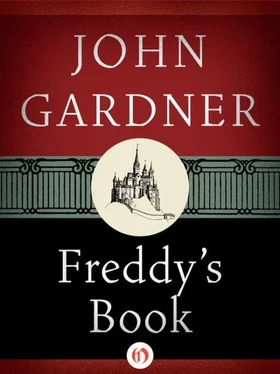In spite of himself, Hans Brask opened his mouth in mock dismay and put the spurs to his horse. Grimly, Lars-Goren laughed.
In the whiteness all around them there were now vague shapes. At first they seemed swirls of dark snow, perhaps trees. As they circled nearer, he made out that they were Lapps and reindeer.
8.
IN HIS TENT OF SKINS, the magician sat tapping on the drum with the tips of his fingers. There was no one else in the tent except the child, kneeling beside the drum, black-eyed and beaver-faced, like the magician, watching intently as the three stones danced on the drumhead. One stone was black, the second stone was white, the third was gray. All three had been formed in a reindeer’s stomach. Lokk, lokk, lokk, sang the magician. His voice made hardly any sound. On the drumhead there were lines, most noticeably one running from east to west, painted in reindeer blood. Two stones, the black and the gray, were on the west side; the white was on the east. In the silence of Lappland, far north of Jokkmokk, the gentle tapping of the magician’s fingers was like thunder.
In Stockholm, King Gustav sat writing at his desk. He was ordering the execution of his enemies, real and imagined. He wrote with his tongue between his teeth, his eyes full of light. Whereas I, King Gustav, took this throne to make peace and bring harmony to my people …
Lars-Goren and Hans Brask lay asleep in a house made of reindeer skin and bone. There were shelves, chairs, tables, all of reindeer parts. Sometimes one of the Lapps came in, moving in perfect silence, with black, wide eyes. Sometimes a reindeer paused outside the door, listening with lifted ears, dark eyes empty. Lars-Goren, sleeping, dreamed that the Devil came and seized his shoulder, shaking him awake.
“Lars-Goren,” the Devil said, “I know what your mission is, and I’ve come to reason with you.” The Devil’s eyes were wide with alarm.
“Very well,” Lars-Goren said, holding his breath.
The Devil opened his hands like a man pleading innocence. “You want to kill me,” he said. “I ask you, what justice is there in that? What harm do I do? Do I exist at all, in fact? The old woman you killed: was that my doing? She was a witch, people say, and so she herself admits. Did I make her a witch? Did I make the people turn against her? Perhaps you will say, ‘Ah ha! Not directly! But you murdered her children!’ Come, come, I answer. Is the Devil bad luck then? Is that what you think? Have you come to destroy bad luck? What makes people strong? What makes horses strong, or trees? Destroy bad luck and you’ll turn the whole world to fat! Oh, it’s true, it’s true, we’d all like bad luck in gentle measure — just enough bad luck to make children brave and strong, never enough to kill them. But what nonsense, my lord! Imagine a world without death in it, without serious pain. A world of mild toothaches. Who’d need a castle in a world like that? Or a church or a museum — even a family. What’s good, with no evil to judge it against? What’s order without chaos? What’s the beauty of a rose in a field of bright red? Bad luck and good, that’s the principle of life itself! I exist insofar as life exists. Rid the world of me and the world will be a barren stone rumbling without purpose through space. It’s the mission of an idiot, this mission you’re on. Not that I blame you. It was Gustav’s idea. He’s a madman, as surely you understand. He began with the best of intentions, of course; but bad luck has overwhelmed him. It’s the usual situation: he failed to get his way — as we all do, we all do! So now he turns on the dearest of his friends like a maniac. Kill him, that’s my advice. You could do it, you know. You could be king yourself. Dalarna will support you. I don’t say it to tempt you — nothing of the kind. I’m slandered on every side: it’s life itself that does the tempting — life and reason. What good is Sweden in the hands of a maniac? I don’t say kill him to advance yourself. Kill him for the sake of justice, and pray for the best — for yourself, I mean: pray that you prove luckier than he was. It’s only a suggestion, you understand. To me it’s a matter of complete indifference, I assure you. The fit will survive; that’s the world’s only law. The fit—” He broke off, his eyes grown suddenly vague, as if he’d lost his train of thought. Lars-Goren raised his head from the pillow of skins, struggling to see deeper into the Devil’s mind, and by moving wakened himself. The Devil disappeared. The house was cold and silent.
“Is that it?” Lars-Goren thought. But the thought was half sleeping, half waking, and now when he tried to think what it was that had dawned on him, the thought would not come clear. “I must make the world safe for Erik,” he thought. He grimaced. “Now there’s an illusion for you,” he thought bitterly. “How can anyone make the world safe for his son?” Nevertheless, he was seeing his family in his mind’s eye, and rational or not, he was thinking he must make the world safe for them.
In his house, the magician closed his eyes, stopped drumming, and smiled. On the drumhead, the white stone had moved nearer to the line and was in danger of falling over. With one finger, the child moved the white stone back where it belonged. Now, though the sun was no higher than before, it was morning.
Bishop Brask said: “I had the strangest dream. I dreamed the Devil came to me and said, ‘Why should you kill me? Think, my dear Bishop! What am I but love, poetry, religion? Call them evil if you like — but don’t deny that they lead in the end to disappointment. But of what earthly value is this mortal life without them? You, you pride yourself on reason. As a child, you loved books but you came to understand that they were tricks and illusions. They told you love stories, but you looked at the world and you saw no such love — on the contrary, you saw people struggling to find the kind of love they’d seen in books, and you saw the illusion destroying marriages. Very well, you said to yourself, I’ll be fooled no longer! And what was the result? Despair! The inability to act! Books, religions, the idea of love — they’re all lies, I admit it, though I’m the father of such lies. But they give goals, shape quests: they give point to your brutal mortal striving. No doubt you’d disbelieve me if I told you God himself is a Devil’s lie. You’d suspect me of interest. Very well then, I won’t say it. But this much you’ll agree with, I’m sure: God is Truth. And what is the truth about this paltry existence and its ending?’ So he spoke, in my dream, and a great deal more in the same vein. But what’s interesting is this: at some point he made a mistake, and I knew I had him. I felt a shock as if lightning had struck me, but that instant I woke up, and whatever the insight was, it was gone.”
“I too had a dream,” Lars-Goren said. He slowly rubbed his hands against the cold and told the bishop his dream.
In Stockholm, King Gustav signed his name with a flourish and folded the parchment, then sealed it with wax. He struck the bell to call his messenger, then rose and paced. “When I was young,” he thought, but then the thought escaped him. He stopped, lips clamped tight, staring out his window at the snow.
In her house, Liv Bergquist stopped suddenly, alarmed by a voice. What it said she could not make out, though she knew. “Erik!” she called. When her son came to her, she said, “See who’s at the gate.”
The headman of the Lapps said, “Very well, we will take you to the Devil.” He shrugged, as if the mission seemed foolish to him. He had a small, wrinkled face and, on his hood, reindeer horns. All around him, the Lapps stood rhythmically nodding. In the endless snowfall, one could not tell which of them were men which of them were women, which of them reindeer. The Lapps called their reindeer “the people of six eyes.” It was a reference to their queer alertness, their attunement with the wind and snow. The Lapps did not really think the reindeer were people, for only in a limited way could the reindeer think. Between them, the Lapps and the reindeer divided all knowledge; so the Lapps believed. Lars-Goren and the bishop took their seats in the sledge, their horses tied behind. Gently, carefully, the Lapps covered the two men with skins. An old woman kissed Lars-Goren on the forehead, making a warm place that remained with him. When the reindeer started up — no one gave a signal, or so it seemed to Lars-Goren — it was as if they’d been running all along.
Читать дальше











